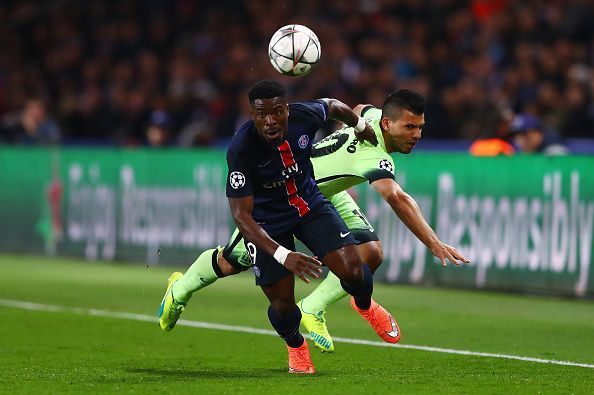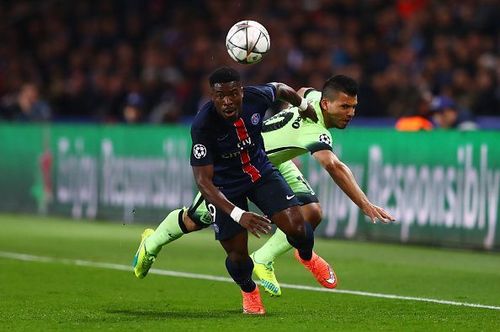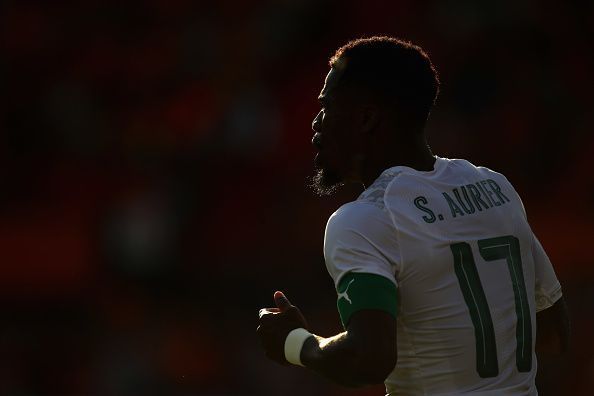
Serge Aurier: Tottenham’s new star shaped by civil war, upheaval and shady characters

Serge Aurier’s life has always, it seemed, been defined by off-field events.
Tottenham could only unveil their latest signing after he faced a courtroom fight to secure a UK visa, having been involved in a fracas with a nightclub bouncer back in May 2016 that led to him receiving a convertible two-month prison sentence.
Consequently and embarrassingly, he missed Paris Saint-Germain’s vital Champions League group stage match against Arsenal last season, though that is simply the latest in a long line of issues that the right-back has had away from the game.
Many of the problems he has brought upon himself. Never was this more apparent than when he criticised PSG team-mates Angel Di Maria and Zlatan Ibrahimovic on a live Periscope chat that subsequently went viral. Erstwhile coach Laurent Blanc was also in the line of fire and it spoke much of the player’s quality that he was not hastily jettisoned after such an unbecoming incident.
Instead, PSG waited until this summer before offloading a player who ultimately proved more hassle than he was worth – particularly with Dani Alves on the market. When the Brazilian signed, it was just a case of where Aurier would go and how much for.
Tottenham is the answer. The 24-year-old has come a long way both literally and metaphorically in a relatively short space of time.
Indeed, to understand Aurier’s off-field problems, it is useful to understand his troubled background.
Born in Ouragahio, Ivory Coast on December 24, 1992, he spent the first nine years of his life living with his father, former professional footballer Leon Gbizie. However, civil war broke out in his homeland and, under the request of his mother, he moved to France, where she now stayed after separating from Gbizie.
“I don’t remember much, just the smells and the sounds,” he admitted in a 2011 interview.

It was in Paris where he was adopted by Michel Aurier, his mother’s new husband, who was a bus driver. Like many immigrants, though, Aurier found himself trapped in one of the poorest suburbs of the capital, Sevran – a district notoriously linked with crime, violence and unemployment.
Indeed, so poor is the area that in 2012 the mayor of the town, Stephane Gatignon, went on a six-day hunger strike in a successful bid to urge the government to help fund measures to alleviate a budgetary crisis in the district.
“I am proud to have grown up there,” he explained in 2014 to So Foot. “When people speak of Sevran, they talk only of violence. But there are also people like athlete Teddy Tamgho or rapper Kaaris who succeed and give a good image of the city. If they can help people in the projects to make them dream and stop doing anything ...
“It must be shown that it is not a dangerous city. And to live in Sevran is not a crime!”
Aurier, however, admits that previously the issues were more complicated and that his youth was not an innocent one.
“It has calmed down. Before, it was more dangerous, much worse. It was something to be afraid of. There was trouble, like in a lot of districts in France,” he said.
“I was hanging about with some shady characters, it's hard to avoid when you live here. That strengthened my mind – somethings you see show a path you don’t want to go down. But Sevran does not bring bad things. I do not feel like an outsider. Here I feel good, I am at home.”
He can be guilty of having a short fuse and a deep sense of grievance when things go against him, as Djamel Femmami, a director at Villepoint, paid testimony to. “If there’s something he can’t stand, it’s an injustice,” he said.
And Aurier has never managed to completely shake off the image of a short-tempered young rascal that was formed in his youth amid family upheaval and a complicated social background.
But Sevran, and more particularly Afid Djaadaoui, provided him with his opportunity as a footballer. It was Djaadaoui who created the ‘Prevention through sport’ programme that allowed Aurier and his brother Christopher, a player who has admitted his attitude meant he fell away from the professional ranks. It led Serge to a successful trial with Villepinte, where he shone to such an extent that he rapidly left for Lens, before securing moves to Toulouse and PSG.
Indeed, it was during the tournaments held in Sevran that his talent was recognised and started him on a path that has led to him playing among the best players in the world in the most competitive league in the game.
And this could be the move that turns him into a world-class performer.
The belief in France is that Aurier had to leave PSG to jettison the baggage of his youth and some of the “shady characters” behind.
He has shown an ability to behave in the past, previously telling brother Christopher, who admits he was far less readily controlled: “Do you realise how lucky you are? Stop your b******t or you’ll end up back in Sevran, then you’ll see how it hurts.”
Now it is time he heeds that same advice.
London and Tottenham will offer Aurier a new start, which is exactly what he needs.